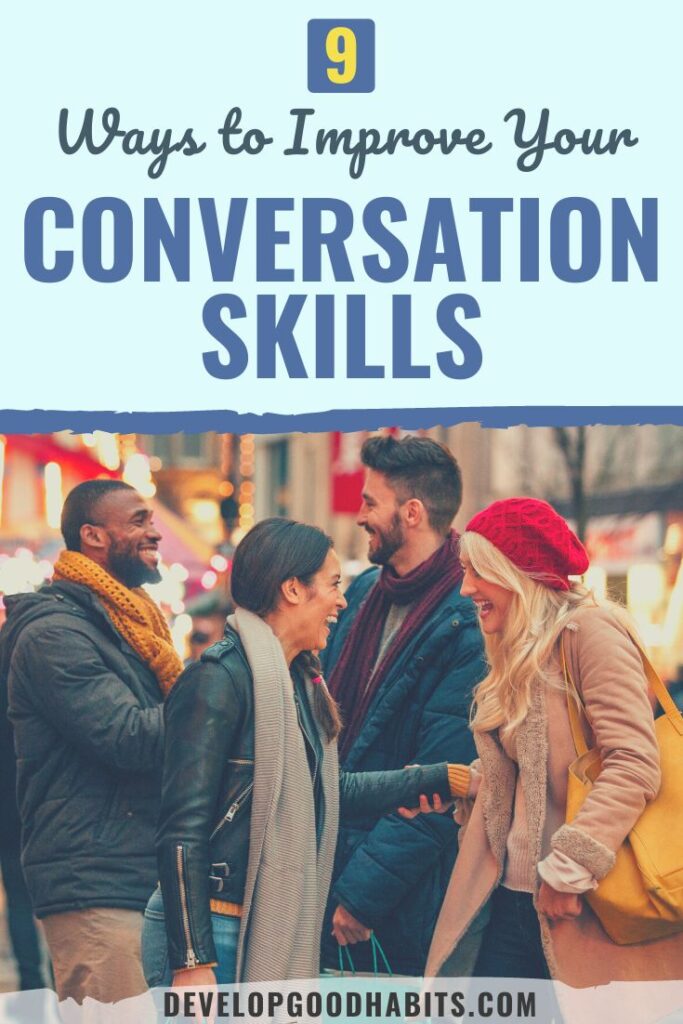There might be affiliate links on this page, which means we get a small commission of anything you buy. As an Amazon Associate we earn from qualifying purchases. Please do your own research before making any online purchase.
When given the choice to call or email someone, do you choose to email without giving it a second thought?
I’ll admit that I always go for the electronic option. It’s more convenient, less intrusive, and it allows me to avoid having to exchange pleasantries.
Technology is a huge part of our lives these days, but the truth is, replacing real conversations with texts and emails is taking vital skills away from people.
We tend to shy away from one-on-one conversations as much as possible, but keeping a balance and continuing to improve your conversation skills can be the difference between huge success in life and… not.
Having conversations is one of the best ways to connect with other people, which is the only way you will be successful in both your personal and professional lives.
In this article, I will talk about 9 ways to improve your conversation skills so you can learn how to best connect with others.
But first, let’s look at why it’s important to improve your conversation skills.
Why Is It Important to Improve Your Conversation Skills?
The experience of exchanging thoughts and ideas with another person in real-time is a part of lifelong learning because you must listen to and interpret what the other person is saying while also assessing their body language.
So, the more conversations you have throughout your life, the better at having them you will become. And, this starts at an early age.
In fact, studies have shown that the interactions that young children experience when a caretaker is talking with them, not to them, create more measurable changes in their brain than the number of words they hear.
Children who engage in conversations early on have more growth of their neural processing capacities, which lays the foundation for stronger literacy skills for later on in life.
There are many types of conversations you can engage in, ranging from intellectual and informational exchanges to witty banter with your partner or close friends.
And there are many different reasons you may engage in conversation, including to engage with or meet new people and to keep the conversation going, to learn new information, and to have fun during social interactions.

It is through conversation that we have the positive experience of being heard, a chance for self-reflection, and are offered opportunities to cultivate empathy.
Having a conversation is just one form of communication, and it takes some skills and knowledge about the elements of communication because having a conversation is often spontaneous and informal–meaning you need to be able to think on your feet. But because being a good conversationalist can make such a huge impact on your life, this is definitely a skill you want to work on.
In your professional life, having good conversation skills can help you increase your job performance, form positive working relationships, gain new clients, and set the framework for promotions in the future. (Learn more about other soft and hard skills to help you in your professional life.)
In your social life, being a good conversationalist can help you attract a mate and build (and maintain) relationships with lifelong friends.
Now that you know why you should want to improve your conversation skills, let’s look at some techniques you can use to be a better conversationalist.
9 Ways to Improve Your Conversation Skills
1. Look Approachable
Be mindful of your body language. If you look closed off or your facial expressions are telling other people that you’re not open to talking, people won’t be rushing over to have a conversation with you.
To look approachable, keep a slight smile on your face when you’re going in for a conversation–or really when you’re in any situation involving a group of people.
Even if you’re not in an especially smiley mood, forcing the muscles into action that makes you smile can trick your brain into feeling happy, reduce stress, and lower your heart rate. So, the simple act of smiling can help improve your mood and make you feel more approachable.
Secondly, keep your head up and stand up straight when you’re around other people. Open up your body language by keeping your posture relaxed and your legs slightly apart–and be sure to face the person you’re talking to.
Maintain eye contact throughout the conversation to show that you’re interested and paying attention to what the other person is saying.
Looking approachable is a big part of communicating your confidence, credibility, and trustworthiness before you even say a word.
Be mindful of how you appear because you never know who is looking at you and making an evaluation of your personality before choosing whether or not to have a conversation with you in the first place.
2. Speak Slowly
When people become stressed, excited, or anxious, they tend to speed up their speech. This prevents listeners from processing the information that is being communicated, as it’s often difficult to keep up with someone who is speaking too quickly.
And the truth is, if a listener can’t keep up with a speaker, he or she will quickly stop trying.
Good conversationalists don’t rush through whatever they have to say. Keep this in mind when you’re talking to someone and remember the importance of taking your time as you reflect on your thoughts before expressing them out loud.

Doing so will help you present yourself as being calm and collected and show your conversation partner that you’re not in a rush to wrap up the interaction. (This would also prevent you from hogging all the time during the conversation. Don't be a conversational narcissist!)
I think we can all relate to the experience of drawing a blank when trying to find the right word and ultimately settling for an inferior synonym. Speaking slowly will help give you time to choose the best words to communicate your thoughts and feelings.
However, an important part of this is also consistently working on developing your vocabulary, as doing so will help you cultivate your conversation skills and help you express yourself more easily. Which leads me to…
3. Read
There are a huge number of benefits to reading, one of which is improving your conversation skills. Reading will help you grow the number of words in your brain’s arsenal, allowing you to find the most precise word to communicate what you’re trying to say.
When you’re reading and you come across a word that you don’t recognize, you’ll probably look up the meaning to contextualize the sentence. Doing this research will help your brain retain the definition and your vocabulary will start to grow.
Secondly, the dialogues that you read in books will help improve your conversation skills by strengthening your ability to quickly form cohesive sentences, which will rarely leave you at a loss for words.
The more dialogues you read, the more conversations you will be exposed to in various contexts. This will help expand your own abilities to engage in a variety of different types of conversations.
Reading will also always give you something to talk about. You will be more informed on what is going on in the world, so whether you’re trying to start a new conversation or you’re jumping into someone else’s, chances are that you won’t be completely lost.
If you don’t stay well-informed, you won’t have much to talk about aside from yourself, and people usually aren’t interested in hearing about your routines or your latest problems. Staying up-to-date with current topics can help you when you’re running low on things to say.
Finally, reading will help you manage your limiting beliefs, allowing you to be open to what other people have to say. If you’re unwilling to try to see things from other people’s perspectives or through different cultural lenses, very few people are going to want to have conversations with you in the first place.
Even if you don’t agree with or completely understand someone else’s stance, you can open yourself up to accepting other opinions and maintaining a balanced perspective.
When you’re open to what other people have to say, you can have conversations with an open mind, which will encourage people to want your opinions as well.
4. Know Yourself
If you lack self-awareness, how is anyone else going to get to know you or connect with you?
You can’t communicate what you’re all about to other people if you haven’t done any self-reflection to uncover your strengths, weaknesses, values, and opinions yourself.
Once you’re confident with who you are, you can listen to other people tell you what’s important to them without letting your own opinions hinder or complicate the interaction.
When you have self-awareness, you know how your words and behaviors impact those around you, and you can manage yourself in a way that makes anyone you’re talking to an important part of your conversation.
You can recognize how other people perceive you and how you can adapt in order to make connections through meaningful conversations. You’re able to sit back and listen without passing judgement and making sure that other people feel their opinions are valued.
Knowing yourself comes with a sense of empowerment that allows you to be confident in the fact that you don’t have to have the last word.
You’re able to have relevant and sincere conversations with people, no matter how different they are from you, without feeling like you need to convince them of your ways.
Watch the video below to learn about 5 self-awareness activities you can do understand yourself better.
5. Ask a Question That Makes the Other Person Have to Think
Asking deeper questions than those that require a yes or no answer can help you reign people into your conversation. There are also some great “would you rather” questions to make your conversations more interesting.
People love talking about themselves. Studies using MRIs have found that talking about oneself activates pleasure regions of the brain, releasing dopamine and making people feel rewarded.
So for example, you can ask someone, “What got you interested in your current career?” or “What is something that you’re really good at doing?”
Once the other person starts to self-reflect, you will have a legitimate conversation going because you will have formed some kind of connection with the other person. If you can spark the conversation, the other person can often keep the fire going for you.
But don’t leave it entirely up to the other person to maintain the conversation on their own. Chime in with some comments and questions along the way and then bounce the ball back for them to respond.
If you're looking for more interesting questions, here's our list of this or that questions you can ask to get to know someone better. Also check out our list of open-ended questions to help start an engaging conversation.
6. Listen for Details
Have some things waiting in your back pocket in case there is a lull in your conversation. Pick up on details that the other person mentions as they’re talking or a particular element of their appearance that you can bring up later on.
For example, if the person is telling you about a business trip they took to Chicago and you’ve also done business in Chicago, keep that fact in the back of your mind so you can later bring up that commonality.
Or, you may notice and mention an interesting piece of jewelry the other person is wearing, an accent that hints to where they grew up, or any other minor detail that shows you’re paying attention.
Keeping some of these smaller details in mind can help quickly expand your conversation if it seems to be heading toward a dead end. Using this trick is sure to save you from some awkward silences in the future.
7. Place Emphasis on What You Have in Common
Research has shown us time and time again that people tend to like other people to whom they can relate. So to improve your conversation skills, emphasize any similarities you see between your conversation partner and yourself.
Not only will this help build a rapport, it will also help the other person feel close to you and develop a sense of trust because they can see a part of themselves reflected in you.
Even if you’re simply mimicking the other person’s body language, it will help them let their guard down and want to engage in a conversation with you.
8. Relax and Be Yourself
Have confidence in yourself. If you’re tense or trying to put on some kind of act, the other person will notice and it will make for an uncomfortable situation.
Take a deep breath before going into a conversation. If you don't try to relax, you may lose your ability to be articulate or say something that is completely unrelated to the conversation.

You want people to like you for you when you’re having a conversation so you don’t have to continue to pretend to be someone you’re not.
By being yourself, you will attract other like-minded people with whom you can develop a deeper relationship. If you’re trying to be someone you're not, you will come across as being fake or insincere.
9. Reflect
If you’re trying to improve your conversation skills, reflect upon interactions that you have with people once they’re done to identify potential areas of improvement.
Did you talk too much? Not enough? Either way, think back to the conversation and look for areas where you could have allowed the other person to talk or where you could have offered some constructive thoughts.
If this is the case, try to pause in future conversations after you make a point to either gain the other person’s agreement or get an alternative point of view.
Also, think about body language cues that the other person may have offered to hint at either stopping or continuing the conversation.
For example, was the other person leaning in as you spoke? Were they making eye contact and acting engaged with what you were saying?
Reflecting on conversations after they’re finished can help you recognize some cues that you may not have picked up on while you were chatting.
Final Thoughts on Improving Your Conversation Skills
Perfecting your conversation skills is a gradual process that takes practice. As you see your confidence improve, you will start to genuinely be more relaxed around other people and willing to put yourself out there more and offer up your own perspectives or experiences.
And you don’t necessarily need to become more outgoing to improve your conversation skills. Instead, you can work on being a better listener, asking appropriate questions, and paying attention to the details of what other people are saying.
All of these qualities are essential to having a successful conversation. By using these tips and practicing often, you can certainly improve your conversation skills. (If you want to learn other skills, check out our post on life skills worksheets!)
Another way to improve is to create SMART goals geared towards improving your communication skills.
Asking interesting questions can help you start great conversations. Here are some lists of questions you might want to try out:
Finally, if you want to ask better questions, then watch this short, 20-minute course to learn how to have a great conversation with virtually anyone.

Connie Mathers is a professional editor and freelance writer. She holds a Bachelor's Degree in Marketing and a Master’s Degree in Social Work. When she is not writing, Connie is either spending time with her daughter and two dogs, running, or working at her full-time job as a social worker in Richmond, VA.


